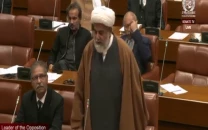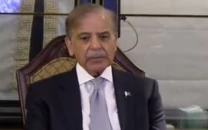NFC’s term ends without award
Finance ministry moves fresh summary for constitution of 10th National Finance Commission

NFC’s term ends without award
The Ministry of Finance has now sent a fresh summary for approval of the president of Pakistan for the constitution of 10th NFC, according to officials. The terms of reference of the new commission might be changed, they added.
It was the fifth commission since 1973 that ended its term without developing consensus on the new NFC award. So far only four commissions have given NFC awards.
The 10th NFC is likely to be notified this week that will try to develop consensus on the 8th award for the distribution of resources between the Centre and provinces – the vertical distribution – and among the four federating units – the horizontal distribution.
There is increasing pressure on provinces to give up part of their fiscal shares or take additional expenditure responsibilities. Wrong policies of the last three federal governments, including that of Pakistan Tehreek-e-Insaf (PTI), have not only led to an exponential increase in expenditures, causing huge debt burden, but have also resulted in stagnant Federal Board of Revenue’s (FBR) tax-to-GDP ratio in 10 years.
Despite transferring various functions to the provinces, the successive central governments have been financing health and education-related expenditures under political expediency. The federal government also made parallel setups at the Centre despite such functions rest with the provinces under the constitution.
The ninth NFC had been constituted in April 2015 to finalise the eighth NFC award but the stakeholders could not reach a consensus after four federating units refused to give up their constitutional shares.
Before completion of its five-year term, the last NFC remained dysfunctional for the past one year after Sindh refused to accept Adviser to Prime Minister on Finance Dr Abdul Hafeez Shaikh as NFC chairman.
Under the Constitution of 1973, the federal finance minister is the chairman of the NFC – a portfolio that currently rests with Prime Minister Imran Khan. The finance minister chairs the NFC that comprises four provincial finance ministers and their respective technical members.
NFC is required to be set up at intervals not exceeding five years as required under clause (1) of Article 160 of the Constitution. The finance minister and provincial finance ministers are statutory members of the NFC. Each provincial government also has the right to include one non-statutory member.
The Balochistan government wanted to appoint former information minister Javed Jabbar as non-statutory member of the NFC from Balochistan.
“It was an honour for me to serve people of Balochistan but I have regretted due to my personal commitments,” Jabbar told The Express Tribune.
Sindh has decided to retain its non-statutory member Asad Sayyed.
The 2010’s 7th NFC award that expired in 2015 is being extended every year by the president of Pakistan due to a lack of consensus on the 8th award.
Under the 7th NFC award, the Centre gets 42.5% of the divisible pool and the provinces receive the remaining share. The remaining 57.5% is distributed among the provinces on the basis of multiple formulas. Eighty-two per cent share is determined on the basis of population, 10.3% is based on poverty and backwardness, 5% on revenue collection and 2.7% on inverse population density.
The last award had been unanimously agreed in 2010 that led to 10% increase in the shares of provinces in federal taxes.
To compensate for this 10% loss to the Centre, the federal government at that time had developed a plan to increase the tax-to-GDP ratio by one percentage point every year to 15% by 2015. However, three successive governments failed to enhance tax collection due to poor performance of the FBR and political compromises struck by every government.
By the end of current fiscal year, the tax-to-GDP ratio is expected to remain around 9.3% – a level that the country had seen 10 years ago.
Compared to this, the provincial governments have managed to increase their revenue collection up to the targets, although overall provincial collection remains very low.
Two distinctive features of the seventh NFC award were allocation of 1% of gross divisible pool to Khyber-Pakhtunkhwa (K-P) to compensate for the losses incurred in the war on terrorism and giving Balochistan’s share on the basis of projected FBR revenue instead of actual collection.
For instance, in this fiscal year, Balochistan will get its 9.09% share on the basis of Rs5.5-trillion FBR’s target instead of expected collection of Rs3.9 trillion.
The Ministry of Finance is strongly in favour of bringing an end to these two special treatments in the new award.
Backed by the International Monetary Fund (IMF), multiple attempts have been made in the past to either shift expenditure responsibilities to provinces or deduct their resources. But all such negotiations have remained unsuccessful.
The finance ministry had proposed cutting the provinces’ share in the range of 6% to 8.2% to meet extraordinary security expenditures and fulfil requirements of Azad Jammu and Kashmir, Gilgit-Baltistan and the erstwhile Federally Administered Tribal Areas (Fata).
But the provinces have taken a unanimous position that they would not support any change in the NFC formula. Provincial finance ministers have urged the IMF to ask Islamabad improve the performance of the FBR instead of blaming the federating units.
There was also a proposal to make changes in the basket of taxes that make the divisible pool through a presidential order.
“At any time before an order under Clause (4) is made, the President may, by order, make such amendments or modifications in the law relating to the distribution of revenues between the federal government and the provincial governments as he may deem necessary or expedient,” says Article 160 (6) of the Constitution.
This effort has also remained unsuccessful.
The IMF is of the view that the 7th NFC award has reduced flexibility in economic management by narrowing the range and effectiveness of fiscal policy instruments at the federal level. The fiscal framework did not create mechanisms for dealing with large unexpected shocks, it added.
In a July 2017 report, the IMF proposed that flexibility of the federal fiscal framework could be improved by establishing a jointly funded contingency fund aimed at absorbing large and unexpected shocks to expenditure of national importance.









1733130350-0/Untitled-design-(76)1733130350-0-208x130.webp)









COMMENTS
Comments are moderated and generally will be posted if they are on-topic and not abusive.
For more information, please see our Comments FAQ